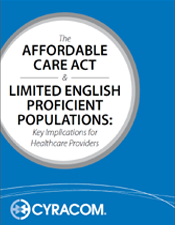Resource:
The Affordable Care Act & Limited English Proficient Populations: Key Implications for Healthcare Providers
Learn about the cumulative effect the Affordable Care Act's major incentive for health care organizations can have on providing the most effective services possible for LEP patients before, during, and after treatment.
The Patient Protection and Affordable Care Act (ACA) aims to reduce the number of uninsured Americans, improve the overall quality of health care, and contain healthcare costs. The Affordable Care Act will create state and federal health insurance exchanges, expand Medicaid subsidies for lower income Americans, and institute individual penalties for being uninsured. Under the ACA, more individuals who are Limited English Proficient (LEP) will have health insurance, will access health services more frequently, and will prefer to receive these services in languages other than English.
However, LEP patients tend to be at greater risk for negative health outcomes and have significantly higher rates of readmission and longer lengths of stay. Over time, LEP individuals will also represent a disproportionately large percentage of the remaining uninsured; patients who regularly access services through emergency departments. Given the incentives and penalties associated with the ACA, serving both insured and uninsured LEP patients will become more expensive. The cumulative effect is a major incentive for healthcare organizations to provide the most effective services possible for LEP patients before, during, and after treatment.

